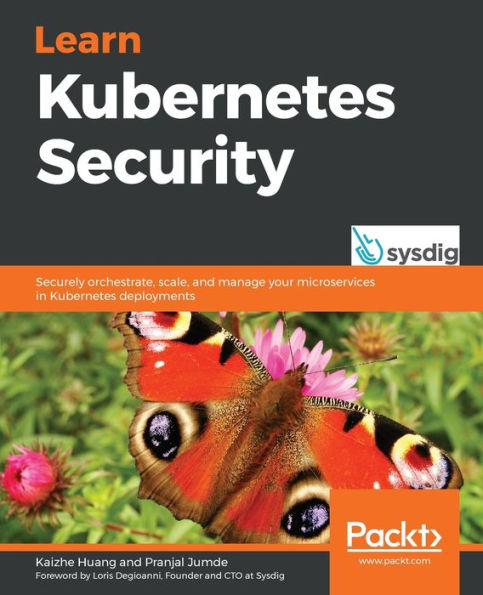Secure your container environment against cyberattacks and deliver robust deployments with this practical guide
Key Features
- Explore a variety of Kubernetes components that help you to prevent cyberattacks
- Perform effective resource management and monitoring with Prometheus and built-in Kubernetes tools
- Learn techniques to prevent attackers from compromising applications and accessing resources for crypto-coin mining
Book Description
Kubernetes is an open source orchestration platform for managing containerized applications. Despite widespread adoption of the technology, DevOps engineers might be unaware of the pitfalls of containerized environments. With this comprehensive book, you'll learn how to use the different security integrations available on the Kubernetes platform to safeguard your deployments in a variety of scenarios.
Learn Kubernetes Security starts by taking you through the Kubernetes architecture and the networking model. You'll then learn about the Kubernetes threat model and get to grips with securing clusters. Throughout the book, you'll cover various security aspects such as authentication, authorization, image scanning, and resource monitoring. As you advance, you'll learn about securing cluster components (the kube-apiserver, CoreDNS, and kubelet) and pods (hardening image, security context, and PodSecurityPolicy). With the help of hands-on examples, you'll also learn how to use open source tools such as Anchore, Prometheus, OPA, and Falco to protect your deployments.
By the end of this Kubernetes book, you'll have gained a solid understanding of container security and be able to protect your clusters from cyberattacks and mitigate cybersecurity threats.
What you will learn
- Understand the basics of Kubernetes architecture and networking
- Gain insights into different security integrations provided by the Kubernetes platform
- Delve into Kubernetes' threat modeling and security domains
- Explore different security configurations from a variety of practical examples
- Get to grips with using and deploying open source tools to protect your deployments
- Discover techniques to mitigate or prevent known Kubernetes hacks
Who this book is for
This book is for security consultants, cloud administrators, system administrators, and DevOps engineers interested in securing their container deployments. If you're looking to secure your Kubernetes clusters and cloud-based deployments, you'll find this book useful. A basic understanding of cloud computing and containerization is necessary to make the most of this book.
Secure your container environment against cyberattacks and deliver robust deployments with this practical guide
Key Features
- Explore a variety of Kubernetes components that help you to prevent cyberattacks
- Perform effective resource management and monitoring with Prometheus and built-in Kubernetes tools
- Learn techniques to prevent attackers from compromising applications and accessing resources for crypto-coin mining
Book Description
Kubernetes is an open source orchestration platform for managing containerized applications. Despite widespread adoption of the technology, DevOps engineers might be unaware of the pitfalls of containerized environments. With this comprehensive book, you'll learn how to use the different security integrations available on the Kubernetes platform to safeguard your deployments in a variety of scenarios.
Learn Kubernetes Security starts by taking you through the Kubernetes architecture and the networking model. You'll then learn about the Kubernetes threat model and get to grips with securing clusters. Throughout the book, you'll cover various security aspects such as authentication, authorization, image scanning, and resource monitoring. As you advance, you'll learn about securing cluster components (the kube-apiserver, CoreDNS, and kubelet) and pods (hardening image, security context, and PodSecurityPolicy). With the help of hands-on examples, you'll also learn how to use open source tools such as Anchore, Prometheus, OPA, and Falco to protect your deployments.
By the end of this Kubernetes book, you'll have gained a solid understanding of container security and be able to protect your clusters from cyberattacks and mitigate cybersecurity threats.
What you will learn
- Understand the basics of Kubernetes architecture and networking
- Gain insights into different security integrations provided by the Kubernetes platform
- Delve into Kubernetes' threat modeling and security domains
- Explore different security configurations from a variety of practical examples
- Get to grips with using and deploying open source tools to protect your deployments
- Discover techniques to mitigate or prevent known Kubernetes hacks
Who this book is for
This book is for security consultants, cloud administrators, system administrators, and DevOps engineers interested in securing their container deployments. If you're looking to secure your Kubernetes clusters and cloud-based deployments, you'll find this book useful. A basic understanding of cloud computing and containerization is necessary to make the most of this book.

Learn Kubernetes Security: Securely orchestrate, scale, and manage your microservices in Kubernetes deployments
330
Learn Kubernetes Security: Securely orchestrate, scale, and manage your microservices in Kubernetes deployments
330
Product Details
| ISBN-13: | 9781839216503 |
|---|---|
| Publisher: | Packt Publishing |
| Publication date: | 07/09/2020 |
| Pages: | 330 |
| Product dimensions: | 7.50(w) x 9.25(h) x 0.69(d) |
